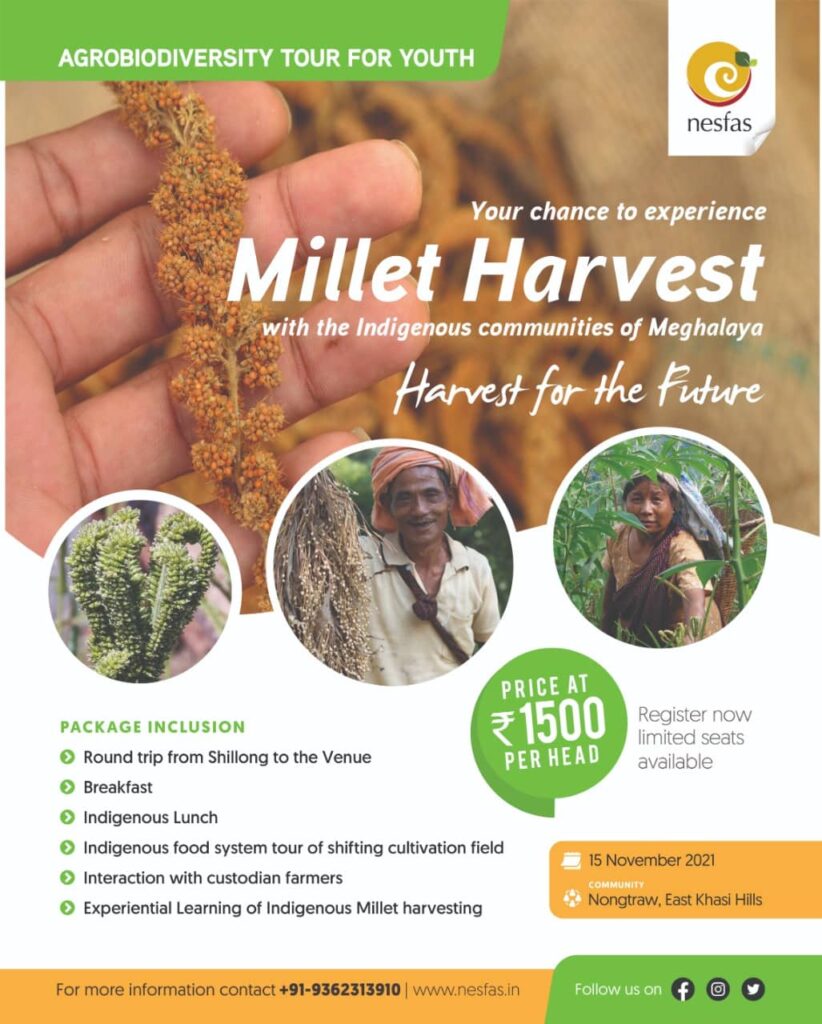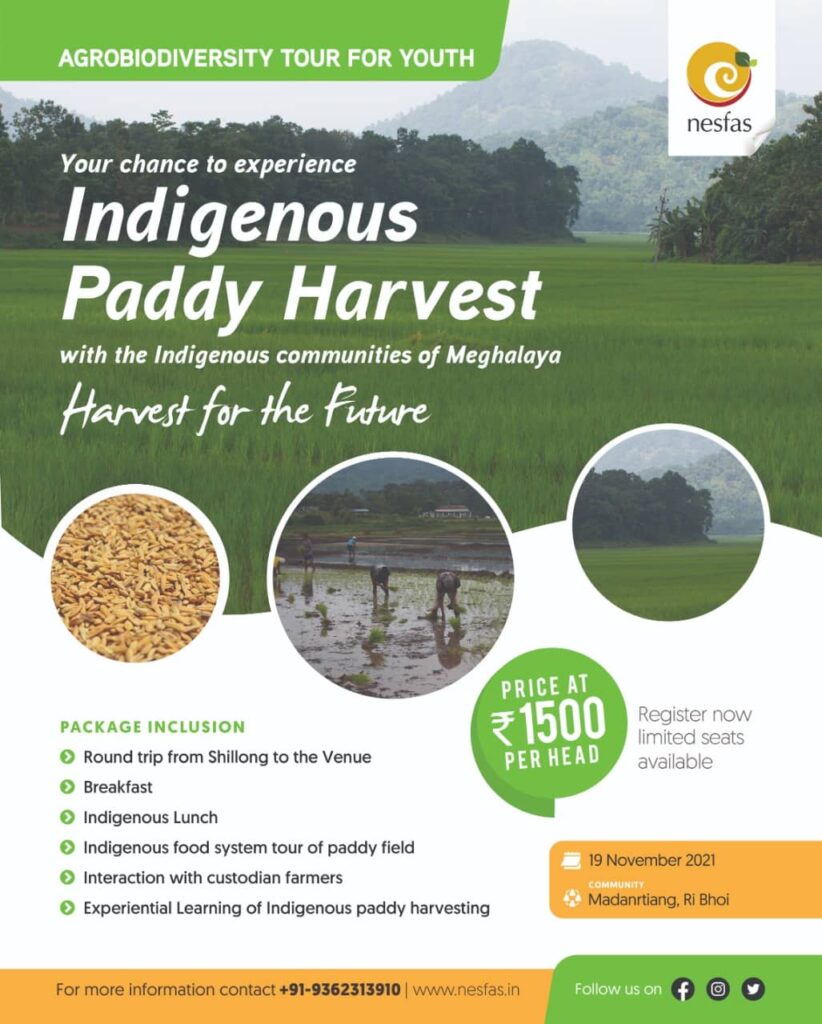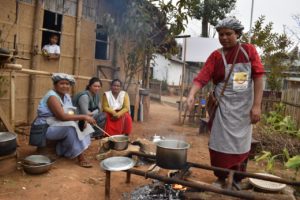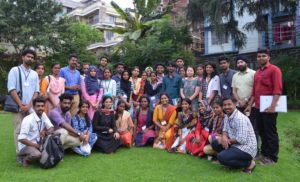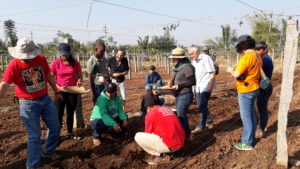The pandemic exposed the fragility of the global food system, made people more conscious about health and nutrition and the dawning realisation of the need to switch to nature- based food production. The Indigenous Peoples’ food systems are vital for food security. These biodiverse systems sustain natural resources, contribute to health and nutrition and sustain livelihoods. The IFS is rooted with a rich cultural heritage that respects and protects land and nature. The existence of invaluable traditional knowledge of crop diversity, food production and seed saving makes IFS an important part of the solution to transform degrading global food systems towards sustainability and resilience.
The IFS of Meghalaya consists of diverse food production systems that includes pynthor, kper, shyrtie, bun and khlaw (wet paddy, kitchen gardens, shifting cultivation, bun cultivation and forest respectively). These systems harbour rich agrobiodiversity of both cultivated and wild species. These systems have been sustainably managed, conserved and protected by indigenous people based on the time-tested traditional knowledge transferred generations after generation.
NESFAS organises Agrobiodiversity (ABD) Walks, where custodian farmers lead youths, children to explore the diversity found in the different systems. These facilitate the inter-generational transfer of knowledge and ensure the continuation of the traditional farming practices. NESFAS will organise a series of ABD tours at different production systems for the urban youths to reconnect with nature and discover how food is produced.
NESFAS invite you to come and spend a day with our community to learn all about the indigenous food system from knowledge holders, enjoy nutritious local food prepared by custodian cooks. Discover why we need to make the shift to clean and healthy food production and be motivated to join the movement to support the voices of indigenous peoples in defending their land and food system
ABD TOUR: MILLET HARVEST
Date: 15th November, 2021
Background: Millet is an ancient grain consumed in the Indian continent. It is called the miracle grain, and hailed as “crop of the future” because it can grow in adverse climatic conditions. It is also highly nutritious, rich in fibre and gluten-free and rich in micronutrients. Millet was an important staple for the people of Meghalaya. They are widely cultivated in the shifting fields of Khasi, Jaintia and Garo Hills. However, with the introduction of modern agriculture and policy push, rice usurped millet as the major staple. The changing pattern of farming and the shift in diet gradually led to the decline in the area dedicated to millet production and substitution with mono cropping of cash crops. With it the knowledge associated with millet production and consumption are also threatened to be lost
Millet is now cultivated in only certain pockets of Meghalaya. NESFAS through the Millet Network partnered with communities to revive, strengthen and support the production and consumption of this superfood.
Nongtraw is among the few villages in Sohra cluster where millet is still the main staple cultivated in shifting fields. Millet is multi-crop with other crops in these fields. Farmers from Nongtraw have been conserving different millet varieties and value adding millet into different products.
This ABD tour will provide opportunity for the urban youth to be introduced to the indigenous food system of Nongtraw, interact with custodian farmers and learn about the process of harvesting millet
About the village: Nongtraw village is located in Khatarshnong Laitkroh Tehsil of East Khasi Hills District in Meghalaya. It is 43 km away from Shillong. There are about 35 households in Nongtraw village. One has to walk down about 3000 steps to reach the village. The people are dependent on agriculture and shifting cultivation or rep shyrtie is the predominant production system. Millet, taro, rice beans, perilla seeds, cassava, bird eye cherry are some of the main crops grown.
ABD TOUR: INDIGENOUS PADDY HARVEST
Date: 19th November 2021
Background: Rice is an important staple for the people of Meghalaya. There are around 6,000 different varieties of rice cultivated in India. Rice is cultivated in a shifting field as hill paddy and in lowlands as wet paddy. In the indigenous paddy-based food production system of the indigenous communities of Meghalaya, the paddy fields harboured a rich source of biological diversity apart from rice. These include wild edible plants, wild fruits and paddy fish. Unlike the industrial monoculture, different native varieties of rice are cultivated in the indigenous paddy systems. These traditional seeds are resilient to adverse conditions. Traditional rice varieties are also considered most nutritious, rich in micronutrients.
However, with the introduction of conventional agriculture, several indigenous varieties are being replaced with high yielding varieties. This is threatening the diversity of indigenous rice varieties, the diversity within the paddy system and the knowledge of production associated with it.
NESFAS is working with rice cultivating communities to safeguard the indigenous rice varieties that.
Madanrtiang is among the rice cultivating communities in the Bhoirymbong cluster. Different varieties of rice are cultivated both in shifting fields and wet land. As the paddy nears harvest time, this ABD tour will provide opportunity for urban youths to learn from farmers about the traditional method of rice production by taking part in the process of harvesting.
About the village: Madanrtiang is a Village in Bhoirymbong Block of Ri Bhoi District of Meghalaya. It is located 49 km away from Shillong. There are about 35 households in Madanrtiang village. People cultivate food in different production systems such as the wet paddy, shifting field and kitchen gardens. This region is known for the authentic Bhoi cuisines which incorporate wild edibles forage
from forest and other production systems. Besides paddy, different varieties of taro and pulses, pumpkins, spices and herbs are among the main crops being cultivated.
ABOUT PACKAGE
Price at Rs 1500/ per head
Package inclusion:
- Round trip from Shillong to the Venue
- Breakfast
- Indigenous Lunch
- Indigenous food system tour of shifting field and paddy field
- Interaction with custodian farmers
- Experiential Learning of Traditional Millet/ Paddy harvesting

